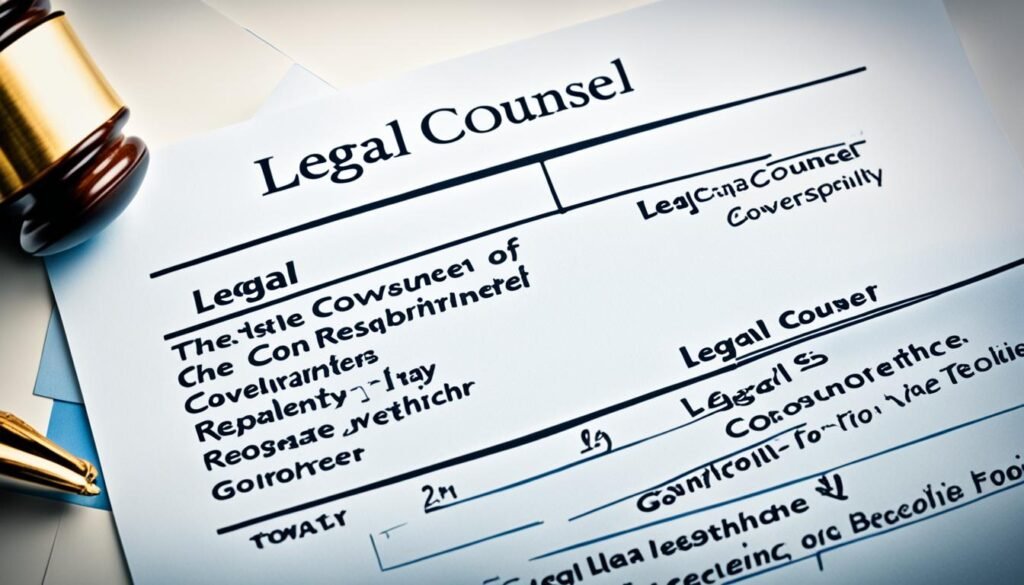Legal Counsel Today’s business world is more complex than ever. The general counsel (GC) plays a key role in keeping corporations strong and successful. They do more than just give legal advice. They oversee the legal department, work closely with top management, and help make major business decisions.
Also Read: The Role Of Legal Precedent In Judicial Decision-making
GCs do more than handle the law. They’re in on the major business decisions and make sure these choices are both right and good for everyone involved. They balance what’s good for shareholders, management, and the board of directors while keeping the company’s best interests first.
The GC’s role has changed because of corporate scandals, financial crises, and how businesses are becoming more global. Now, they look after legal matters, manage relationships with outside lawyers, and help plan for the future. They’re also key in advising the board of directors on complex legal issues and big decisions.
Key Takeaways
- The role of the general counsel (GC) has become more strategic and integrated, going beyond just providing legal advice.
- GCs are expected to balance the interests of various corporate stakeholders and advise on the legality and ethical implications of proposed actions.
- GCs are responsible for managing legal resources, overseeing outside counsel relationships, and participating in strategic planning and risk management.
- GCs are increasingly seen as key advisors to the board of directors, helping them navigate legal and regulatory complexities.
- The evolution of the GC’s role has been driven by factors such as corporate scandals, financial crises, and the globalization of businesses.
Introduction to Corporate Governance
Corporate governance is all about the rules and practices that guide how a company operates. Its main goal is to make sure the company grows in a way that benefits its owners, shareholders, and others involved.
Also Read: Legal Rights In The Digital Age: Privacy And Data Protection
Definition of Corporate Governance
Good corporate governance sets up a system where all parts of the company keep an eye on each other. This system helps prevent wrong actions and makes sure the company runs in a fair and clear way, meeting everyone’s needs.
Importance of Corporate Governance
Having solid corporate governance is key for a company to reach its goals. It brings clarity, makes the company responsible, and promotes making decisions that are right and honest. These things are very important for the company to last a long time.
Key Stakeholders in Corporate Governance
The important people and groups in corporate governance are the shareholders, the company’s directors, its leaders, workers, buyers, and others connected to the business. They all have a big interest in how the company does and the choices its leaders make.
Legal Counsel: Definition and Role

A legal counsel, or general counsel (GC), is a lawyer for a company. They advise and guide the organization legally. A legal counsel’s key tasks are creating and checking contracts, making sure the company follows the law, handling legal fights, and suggesting on reducing risks.
Also Read: The Litigation Process: From Filing To Verdict
What is a Legal Counsel?
Legal counsels are experts who are the top legal advisors for a company. They guide on many legal issues and ensure the company follows laws. This includes managing the company’s legal matters and complying with laws and rules.
Primary Responsibilities of a Legal Counsel
The main job of a legal counsel involves:
- Drafting and checking contracts for the company’s benefit
- Making sure the company follows the law
- Handling legal battles and disagreements
- Helping the company make smart decisions by managing risks
Evolving Role of Legal Counsel
In recent times, the legal counsel’s role has changed. Now, they are expected to take on more strategic roles in companies. They’re not just advisors anymore but also important partners in decision-making. They now have roles like:
- Being the company’s face in legal matters with outsiders
- Leading negotiations on important deals
- Managing the company’s legal team
- Working closely with top company management and helping with business choices
Legal Counsel’s Responsibilities in Corporate Governance

The legal counsel is a key part of top-notch corporate governance. They make sure the company follows all relevant laws and guidelines. This keeps the company out of trouble and away from financial and reputational harm.
Also Read: What Are The Key Components Of Effective Career Education Systems?
Advising on Risk Management
Legal counsel does more than just keep things compliant. They’re also big on advising risk management. They spot, assess, and find ways to lower the company’s legal and reputation risks. This means they look into the legal side of new business plans and deals to keep the company safe.
Drafting and Reviewing Contracts
Legal counsel is also in charge of making and checking the company’s contracts. They’re careful to make sure these contracts legally protect the company and meet its goals. Their knowledge of the law and negotiation helps the company avoid legal troubles and keep good ties with clients and suppliers.
They help the company grow in a smart, ethical way. Their advice makes it easier for the company to understand and follow the law. Plus, it helps the company make decisions that benefit everyone involved.
The Relationship Between Legal Counsel and the Board

The legal counsel is crucial for the board, guiding them on legal issues related to their roles and the company’s plans. This relationship is vital for good corporate governance and protecting the company’s and stakeholders’ interests.
Also Read: Comparative Jurisdiction: How Different Systems Operate
Legal Counsel as a Key Advisor
The general counsel (GC) is a top legal advisor, helping the board understand and navigate complex legal matters. The GC’s advice ensures that the board’s decisions follow the law while meeting the company’s goals.
Attending Board Meetings
Legal counsel often attends board meetings to keep up with the company’s actions. This allows them to offer legal guidance quickly. Being part of meetings helps the GC anticipate legal issues and stop them in their tracks.
Educating the Board on Legal Matters
Another key duty for legal counsel is making sure the board knows about important legal and regulatory topics, as well as how to set up committees and choose advisors. This knowledge helps the board carry out their duties and decide what’s right for the company.
It’s important for the board to trust the legal counsel so they can ask questions freely. They should know that the GC will keep things confidential and always act in the organization’s best interest.
Legal Counsel’s Role in Strategic Decision-Making

Legal counsel are key in making sure the organization’s big decisions are smart and safe. They look at the risks and good points of planned moves. GCs don’t just check if a plan is legal. They also think about the effects it might have on the business’s name and how we see it.
Assessing Legal Risks and Opportunities
They tell us how legal changes can affect our business spot and chances to grow. By including legal ideas in our big plans, they help us avoid bad risks. It makes our decisions better and safer, helping us reach our goals.
Providing Insights on Regulatory Changes
They’re vital for making wise strategic choices. They balance the law and business sides of plans. This way, we move forward carefully, following the rules but still seeing chances to grow in a good way.
Managing the In-House Legal Team

The legal counsel does more than give legal advice. They also lead the organization’s legal team. Their job is to make sure the legal department runs smoothly and does its work well.
Overseeing the Legal Department
They watch over the legal department. This means checking on its people, work, and resources. They make sure the department helps meet the company’s goals and legal needs.
Budgeting and Cost Management
Managing money is a big part of the legal counsel’s job. They set and control the legal department’s budget. This ensures the department gives good services without overspending.
Supervision and Training
Supervising and training legal team members is also on their list. They make sure everyone has the right training and stays updated. This guarantees the legal team can meet the organization’s changing legal needs.
Good management is key for the legal counsel. It helps the whole team add real value to the organization. They make sure legal work supports the company’s plans and goals.
Ethics and Professional Responsibility

Being a licensed attorney comes with a big duty. Legal counsel must always act in the best legal and ethical ways. They do this for themselves and when advising a company. Keeping secret what clients say and advising on avoiding conflicts is key.
Upholding Legal and Ethical Standards
Legal professionals work to meet the needs of many in a company. They look out for the company’s good always. Sticking to ethical rules is vital. This helps keep the trust of the company’s leaders and those involved.
Maintaining Attorney-Client Privilege
Keeping what clients say private is a major part of a lawyer’s job. This privacy allows clients to talk freely with their lawyers. It helps legal counselors give the best advice and help without fear.
Identifying and Mitigating Conflicts of Interest
Legal counsel must always watch out for conflicts of interest. They make sure there are no issues between the company, its leaders, and their own jobs. Doing this well keeps their advice valuable and keeps trust strong.
Collaboration with External Legal Counsel

In-house legal team members are key in handling the company’s legal issues. But, at times, the organization might need outside legal experts. They handle specific legal issues or tough business deals. Managing these relationships is crucial. It ensures these external services meet the company’s legal and business goals.
Managing Outside Counsel Relationships
Selecting the right external legal help is important. The in-house legal team must choose wisely. They need to make sure these external experts have the right skills. They also set rules and ways to work together clearly. This helps the team up with them smoothly.
Evaluating Legal Costs and Fees
Keeping a close eye on costs and what you’re getting is key. The in-house team has to watch over the external legal costs. They make sure the money you spend matches the service’s value. This means balancing the need for experts with what the company can afford.
Legal Counsel in Mergers and Acquisitions
In mergers and acquisitions, legal counsel is key. They take part in due diligence to find and manage legal and regulatory issues. Their expertise is crucial for protecting the organization’s interests.
Due Diligence and Risk Assessment
Legal counsel carefully checks the target company’s legal standing and risks. They aim to ensure informed decisions to lower legal and financial risks.
Negotiating and Drafting Agreements
They lead in negotiating and drafting contracts needed for the merger or acquisition. Their job is to protect the organization’s interests and ensure legal compliance. They handle purchase agreements, intellectual property rights, and more.
Legal counsel guides the organization with strategic advice. They help in making decisions that are legally correct for a smooth transaction.
Conclusion
The role of legal counsel has changed a lot lately. Now, general counsels (GCs) do more than give legal advice. They play a big part in the organization’s strategy. They check legal rules, manage risks, and help make big decisions.
GCs also lead the in-house legal team and work with outside lawyers. They help the organization follow the law in a changing legal world. They also help with ethical business practices and growth.
Legal counsel balances many interests to help the organization do its best. Their role is important and still growing. They are key advisors and partners in business. They are very important to the companies they work for.
FAQs
Q: What are the responsibilities of legal counsel in corporate governance?
A: Legal counsel in corporate governance are responsible for providing legal advice and guidance on a range of issues such as compliance, risk management, and ensuring the company operates within the framework of laws and regulations.
Q: What is the role of an attorney general in corporate governance?
A: The attorney general oversees the legal counsel division and advises on legal issues impacting the company. They play a crucial role in addressing pending legal matters and ensuring compliance with laws.
Q: How does the legal counsel division customize legal advice for the company?
A: The legal counsel division tailors legal advice to the specific needs of the company, taking into account the industry, size, and unique challenges it faces. Legal strategies can vary widely based on these factors.
Q: What kind of legal services does the office of legal counsel provide?
A: The office of legal counsel offers a range of legal services including drafting legal opinions, providing legal advice on pending matters, and responding to requests from the counsel to the president or other executives.
Q: How does the assistant attorney general support the legal counsel in corporate governance?
A: The assistant attorney general assists in overseeing legal matters within the company, ensuring compliance with laws and regulations, and working closely with the legal team to address any legal issues that may arise.
Q: Who is typically in charge of the attorneys in the legal counsel division?
A: The general in charge, often a senior attorney or legal executive, oversees the attorneys in the legal counsel division and ensures that legal services are provided effectively and efficiently.
Q: How does the legal counsel division handle legal opinions of the attorney general?
A: The legal counsel division reviews and implements legal opinions provided by the attorney general, ensuring that the company adheres to legal guidance and stays compliant with relevant laws and regulations.
Q: What is the significance of the legal counsel job description template in corporate governance?
A: The legal counsel job description template outlines the responsibilities, qualifications, and expectations for legal counsel within the company, ensuring transparency and alignment in roles and responsibilities.
Q: How does the deputy attorney general support the attorney general in corporate governance?
A: The deputy attorney general assists the attorney general in overseeing legal matters, providing legal advice, and ensuring the smooth operation of the legal counsel division within the company.
Source Links
- https://www.diligent.com/resources/blog/role-general-counsel-corporate-governance
- https://www.dentons.com/en/insights/alerts/2020/january/29/the-role-of-general-counsel-in-corporate-governance
- https://www.boardeffect.com/blog/role-general-counsel-governance/





